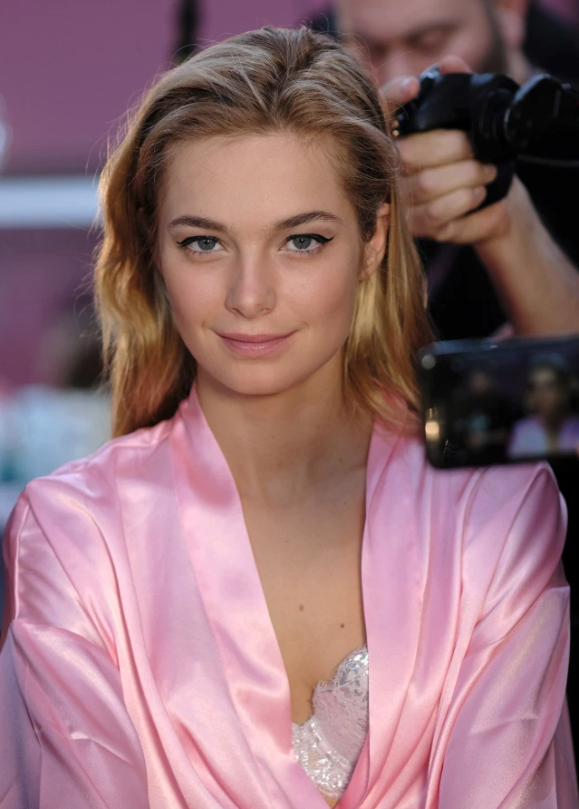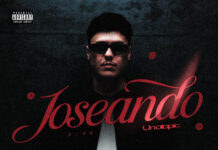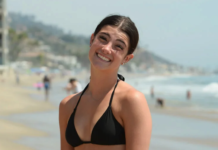Former Victoria’s Secret model Bridget Malcolm has gone viral for exposing the brand’s harmful atmosphere and slams their attempt at diversity and women’s empowerment as a “joke.”
The brand has faced years of criticism and recently announced that it will be replacing its “Angels” with the “VS Collective” including athletes, activists and actors as the lingerie brand’s new spokespeople.
In a TikTok video captioned “too little too late Victoria’s Secret,” Malcolm exposes how unhealthy and underweight she was while walking in the 2016 Victoria’s Secret annual fashion show.
The 29-year-old shared, “I found my bra from the 2016 Victoria’s Secret fashion show. It is a size 30A, I am now a size 34B which is healthy for me.” Putting the bra on during the video, Malcolm shows just how small the size is for her now-healthy body.
Showing a picture of her wearing the 30A bra in the fashion show, she continues, “Look how big it was on me, the sadness behind my eyes from the 2016 show breaks my heart.”
She further alleged that Ed Razek, the former chief marketing officer for L Brands, rejected her for the 2017 Victoria’s Secret show. She claimed that he said her body “did not look good enough” when she moved up to a 30B.
She finishes the video, “Victoria’s Secret your performative allyship is a joke” in response to the company’s rebranding.
“There is a new leadership team at Victoria’s Secret who is fully committed to the continued transformation of the brand with a focus on creating an inclusive environment for our associates, customers and partners to celebrate, uplift and champion all women,” the company told The Post in a statement.

The Australian model has been one of the loudest voices condemning the popular lingerie brand and the modeling industry as a whole.
Malcolm first spoke out about Victoria’s Secret and the modeling industry in 2018 when she publicly discussed her battle with an eating disorder that “left her with a ruined digestive system and chronic anxiety” with Harper’s Bazaar.
Since then, Malcolm has been “on a crusade to demystify the process of achieving sample size” and has more recently turned to TikTok to do that.
In her most recent video, she claimed her agents would allegedly encourage her to take cocaine, have sex and continuously pushed her to lose weight while she was underage.

She claimed that she was “groomed by an older man, sexually assaulted multiple times” and eventually developed eating disorders, PTSD, depression, anxiety and a reliance on alcohol, Xanax and Ambien all before she turned 18 years old.
On her 26th birthday, she had a breakdown and was unable to leave her house for a year “without having panic attacks and severe anxiety” and “suicidal ideations.”
The model has returned to the industry, working with brands that make her feel safe and has decided to speak out now after finally reaching a healthy point in her recovery.
She is speaking out because she is “a strong believer that the fashion industry needs to change” because her “job should not include abuse.”
Razek resigned from his role at L Brands, the parent company of Victoria’s Secret, in 2019, days after the lingerie brand hired its first transgender model. The former top executive sparked outrage the year before when he insisted that the Victoria’s Secret fashion show “should not” feature “transsexuals” because it would disrupt the “fantasy.”
In recent years, the brand has made numerous attempts to try and diversify its image amid backlash and plummeting sales.

The announcement of the “VS Collective” follows the cancellation of the annual Victoria’s Secret Angel’s runway show in 2019, which had run every year since 1995.
The “VS Collective” includes American soccer star Megan Rapinoe, actress Priyanka Chopra, LGBTQ model and activist Valentina Sampaio, photographer Amanda De Cadenet, world champion freestyle skier Eileen Gu, plus-size model Paloma Elsesser and South Sudanese-Australian model Adut Akech.
Martin Waters, CEO, admitted to the New York Times that the company had been “too slow to respond” to the changing world.
“We needed to stop being about what men want and to be about what women want,” Waters said, adding that the Victoria’s Secret Angels are no longer “culturally relevant.”








